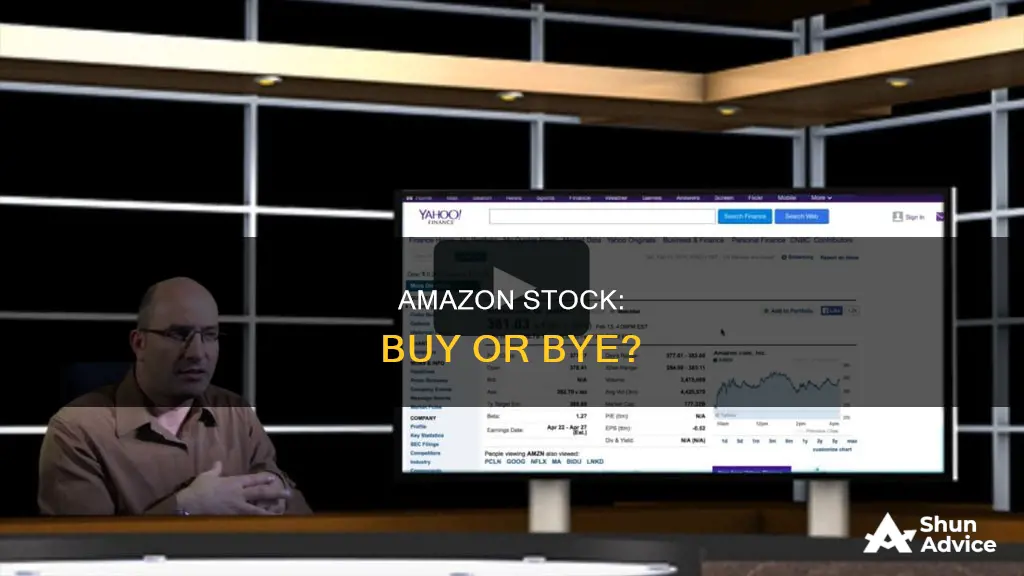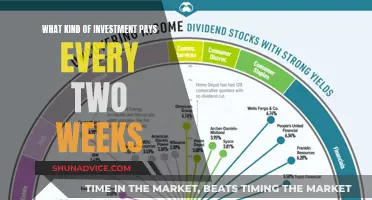
Amazon has been one of the best long-term stocks in history, with its share price rising more than 1000% over the last decade. The company has also expanded into multiple industries, including cloud computing, artificial intelligence, and digital streaming. Amazon's success has been reflected in its financial performance, with its annual revenue, operating income, and free cash flow soaring over the past five years.
However, there are some risks to consider before investing in Amazon. The company operates on tight profit margins and faces increasing competition from brick-and-mortar retailers like Walmart and Target, as well as upstarts such as Temu and Shein. Amazon is also facing a major antitrust battle with the US government, which could impact its future performance.
Despite these challenges, most analysts consider Amazon stock a buy. The company's strong financial position, diverse business segments, and potential for future growth make it an attractive investment opportunity for those with a long-term mindset.
What You'll Learn

Amazon's market performance
Amazon's share price has been on an upward trajectory in 2023 and 2024, rising from a split-adjusted low of $84 at the end of 2022 to over $180 in late June 2024. The company's first-quarter earnings report in late April 2024 showed a 216% year-over-year earnings increase, and sales were up 13% at $143.3 billion, exceeding analyst expectations.
Amazon's revenue for the first quarter of 2024 was $143.3 billion, a nearly 13% increase from the previous year. Net income was $10.4 billion, a 229% increase, and total operating expenses were $128 billion, up from $122.5 billion in 2023. Amazon's net cash flow also improved, and the company beat earnings per share estimates, posting an EPS of $0.98 compared to the expected $0.83.
Amazon's retail business has been a significant contributor to its profitability. In the first quarter of 2024, about 42.5% of Amazon's revenue came from retail, with the rest coming from services, particularly AWS sales. The company's international retail operations swung to a $900 million operating profit, and its North American operations contributed $5 billion in operating income, a 450% increase from the previous year.
Amazon's high-margin advertising business is also driving profits, with ad sales jumping 24% year-over-year to $11.8 billion. Additionally, Amazon's investment in AI and machine learning technologies, such as warehouse robotics and automation, is expected to help cut costs and increase efficiency.
Despite Amazon's strong performance, it faces challenges, including increasing regulatory scrutiny and competition from companies like Walmart. However, with a market capitalization of $1.9 trillion as of May 20, 2024, Amazon remains one of the world's most valuable companies, and analysts broadly give Amazon a "buy" rating.
Blackberry Stock: Why the Hype?
You may want to see also

Amazon's financial health
In the first quarter of 2024, Amazon reported a 216% year-over-year earnings increase to 98 cents per share, and sales were up 13% at $143.3 billion, beating average estimates from analysts. Its retail business has also been profitable, with overall operating income for the first quarter of $15.3 billion, exceeding expectations.
Amazon's cloud business, Amazon Web Services (AWS), is a key profit driver, contributing two-thirds of the company's operating income in 2023. AWS is currently battling Microsoft to be the leading cloud platform for generative artificial intelligence. In 2023, AWS launched several AI tools, including Bedrock, CodeWhisperer, and HealthScribe. Amazon is also investing in AI startups, such as its $4 billion deal with Anthropic, the developer of the chatbot Claude.
Amazon's revenue is expected to grow 11% to $638.8 billion in 2024, and its operating income is projected to climb 68% to $62 billion. Its long-term prospects also look promising, with the e-commerce market projected to expand at a compound annual growth rate of 10% until at least 2028, and the AI market projected to develop at a CAGR of 37% until at least 2030.
However, Amazon faces some challenges, including increased competition from brick-and-mortar retailers like Walmart and Target, as well as upstarts like Temu and Shein. Additionally, it is facing a significant antitrust battle with the U.S. government, with regulators challenging its market power.
Why Invest in Entertainment?
You may want to see also

Amazon's growth prospects
One of Amazon's key growth catalysts is its cloud platform, Amazon Web Services (AWS). AWS contributes significantly to Amazon's bottom line, and the company believes it is still in the early stages of growth in enterprise and public sector adoption. AWS has been a consistent performer, generating a 34% revenue increase in the fourth quarter of 2019 and continuing to grow in line with that trajectory. The consistent growth is rooted in the value AWS brings to organisations by freeing up capital and enabling companies to focus on their unique offerings.
The e-commerce market is projected to reach $3.6 trillion in 2024 and expand at a compound annual growth rate (CAGR) of 10% until at least 2028. Amazon currently holds a leading 38% market share in online retail, which is expected to drive significant growth in the coming years.
Amazon's performance in the last year highlights the importance of long-term investing. The company's revenue rose 12% year-over-year to $575 billion in 2023, and its operating income tripled to $37 billion. Amazon's high-margin advertising business is also contributing to profits, with ad sales jumping 24% year-over-year to $11.8 billion.
Analysts' projections for Amazon's future performance vary. Some estimate a 42% EPS CAGR through 2031, while others expect a slower growth rate. However, the consensus is that Amazon's stock is a buy, with strong long-term potential.
Investing in Ideas: Backing Brainpower
You may want to see also

Amazon's competition
Online Marketplaces
Online marketplaces are platforms that facilitate transactions between buyers and sellers. They provide a convenient option for sellers who don't want to invest in their own platform, and shoppers often prefer them for repeat purchases. Examples of Amazon's competitors in this category include:
- Alibaba: A Chinese company that connects wholesalers to businesses worldwide. It offers wholesale selling, which sets it apart from Amazon, and has expanded to include Taobao (similar to eBay) and Tmall (similar to Amazon).
- EBay: An online marketplace that enables buying and selling between businesses and individuals. It is one of Amazon's top competitors in the US, preferred by a majority of online sellers despite being dwarfed by Amazon's size.
- Etsy: A popular online marketplace for unique, handmade, and vintage items.
- Google Express: Google's shopping platform.
Click and Mortar Retailers
These are companies that have both online and physical stores. They have the advantage of a physical presence in addition to their online retail operations. Major competitors in this category include:
- Walmart: Walmart has a strong physical presence, with almost 90% of Americans living within 10 miles of a Walmart store. While Amazon leads in online sales, Walmart's total revenue is nearly double that of Amazon.
- Apple: Apple's success is largely attributed to its premium branding and physical stores. It proves that a brand focusing on a specific category of products can still compete with online giants.
Social Media Marketplaces
Social media platforms have integrated shopping features, creating a seamless shopping experience for users. Amazon faces competition from:
- Facebook: Facebook Marketplace launched in 2016, and Facebook Shops in 2020, allowing users to shop directly on the platform.
- Pinterest: Introduced Shopping Ads and Shoppable Pins, enabling users to make purchases without leaving the platform.
Niche E-Commerce Vendors
Niche stores focus on specific products and services, allowing them to cater to loyal customers who prefer shopping with specialist companies. Examples include:
- TREEHOUSE kid & craft: A Georgia-based small business specialising in high-quality kids' toys, art, and books from around the world.
- RT1home: An online boutique offering unique, designer products.
Other Notable Competitors
While not falling into the above categories, these companies also pose significant competition to Amazon:
- Target: Target has a loyal customer base and offers convenient services such as same-day delivery, order pickup, and drive-up pickup.
- Flipkart: One of India's leading online e-commerce sites, with a business model similar to Amazon's.
- Rakuten: A top Japanese e-commerce company with a diverse ecosystem, including a streaming service, banking, payments, telecoms, and insurance.
- Netflix: The biggest competitor to Amazon Prime Video, offering popular original content and subscription services.
Investing: Why the Fear?
You may want to see also

Amazon's investment risks
Uncertainty about future profits
Amazon operates on very tight profit margins and has not always been profitable. In 2012 and 2014, for example, the company lost money while growing. Amazon's management is committed to infrastructure expansion and growing investments in research and development, necessitating high operating expenses.
Slowdown in profit growth
Amazon's growth has been impressive, but it is showing signs of slowing down. In the fourth quarter of 2023, revenue from its cloud platform, Amazon Web Services (AWS), rose 13% year over year to $24 billion. While this is still significant growth, it is lower than the company's growth rate in previous years.
Competition
Competition is one of Amazon's toughest operational risks. The retail industry is highly competitive, and Amazon's competitors include formidable companies such as Walmart, Target, Costco Wholesale Corporation, and specialty retailers such as Staples and Best Buy. These companies have invested heavily in online sales channels, threatening Amazon's dominance in the market.
Regulatory and legal challenges
Amazon is facing increasing regulatory scrutiny and legal challenges related to its market power. In September 2022, the Federal Trade Commission and 17 state attorneys general filed a major antitrust lawsuit against the company, accusing it of using its market power to inflate prices and overcharge merchants. Amazon denies these allegations, but the lawsuit could result in significant fines or restrictions on its business practices.
No dividend payments
Amazon does not currently pay dividends to its shareholders. The company has never paid a dividend since going public in 1997. Instead, Amazon prefers to reinvest its profits into the business to fuel future growth. While this strategy has contributed to the company's success, some investors may prefer companies that provide regular dividend payments.
Cola-Cola Investors: Who's Involved?
You may want to see also







